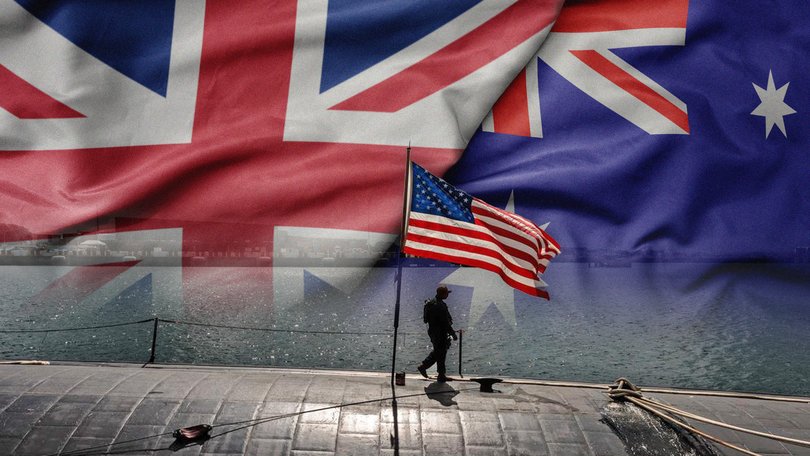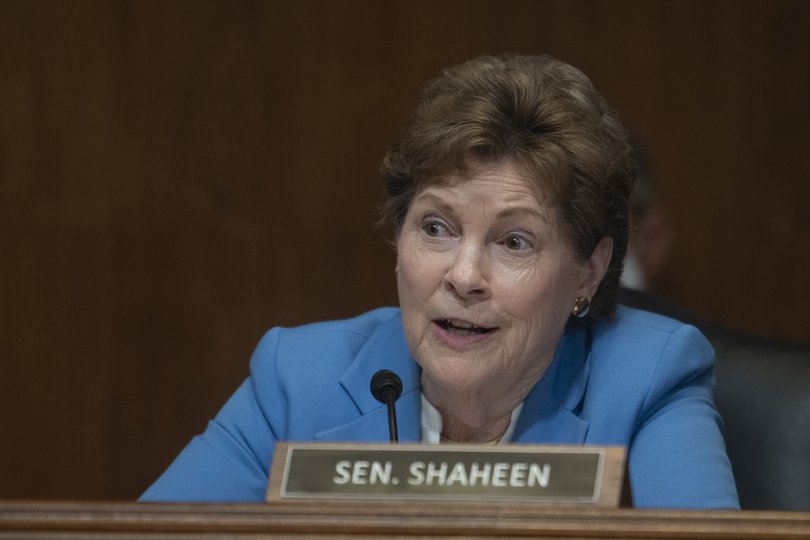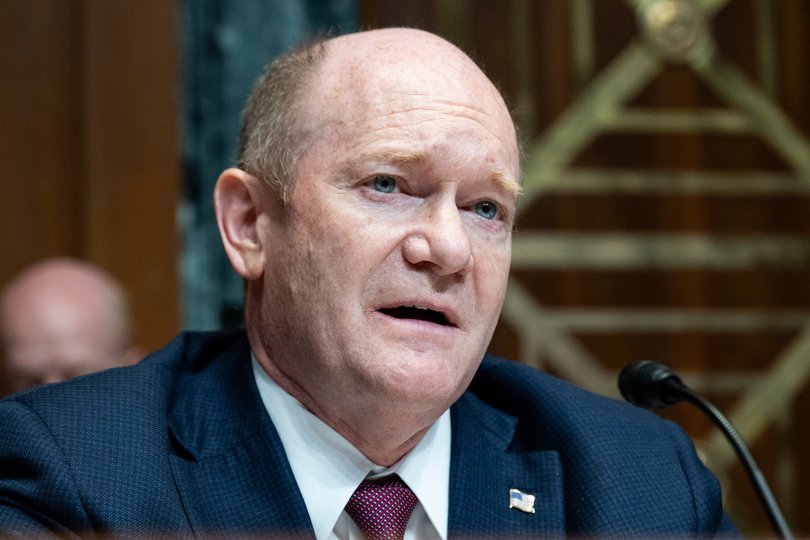LATIKA M BOURKE: AUKUS is critical to US and global security, Democratic Senators Coons, Shaheen say
LATIKA M BOURKE: Two US Senators have exclusively told The Nightly of their concern over the future of the AUKUS agreement under US President Donald Trump’s administration, amid a Pentagon review.

AUKUS is critical to US and global security, Democratic Senators Chris Coons and Jeanne Shaheen have said.
The comments, made exclusively to The Nightly on the sidelines of the NATO summit in The Hague, came as the Pentagon said in new budget documents that it was “demanding regional allies and partners to significantly increase their own level of defence effort” as part of its strategy to deter the Chinese from “seizing control of the Indo Pacific.”
The Pentagon’s leading AUKUS-sceptic Elbridge Colby is overseeing a snap review into the program, to see if the Trump Administration should honour Joe Biden’s deal to sell Australia between three and five nuclear-propelled submarines beginning in the early 2030s.
Sign up to The Nightly's newsletters.
Get the first look at the digital newspaper, curated daily stories and breaking headlines delivered to your inbox.
By continuing you agree to our Terms and Privacy Policy.Mr Colby and US Secretary of Defence Pete Hegseth have both publicly urged Australia to raise its defence spending to 3.5 per cent of GDP, in line with the new NATO benchmark, which Prime Minister Anthony Albanese is resisting.
Additionally, the US Navy is struggling to build enough boats amid fears China’s President Xi Jinping could attack Taiwan “imminently.”
Speaking at the Aspen Ideas Festival last week, Australia’s Ambassador to the US, Kevin Rudd, said Xi was out to get Taiwan.
“We should be under no illusion as friends, partners and allies, United States, that Xi Jinping wants Taiwan and he’s prepared to use military force to do it, if he cannot achieve it by diplomatic or political means,” Mr Rudd, also a scholar on Xi Jinping, said.
But the former prime minister played down any suggestion of AUKUS’ demise and said he was “completely relaxed” about the review, claiming it was standard behaviour of new governments.
“There is going to be an internal review,” he said.
“That is just normal.
“We would do the same thing if we were in the Administration’s shoes as well.”
Mr Rudd referenced Keir Starmer’s exchange with President Trump at the G7 in which the UK prime minister said he supported AUKUS. President Trump praised only the US-UK Alliance, as evidence of support for AUKUS at the highest levels of the Administration.
And he pointed to the statements of support for AUKUS previously made by Mr Hegseth and Secretary of State Marco Rubio as well as bipartisan support in Congress.
Democratic Senators Jeanne Shaheen and Chris Coons said AUKUS must go ahead.
“I’m very concerned to make sure that we go forward with AUKUS,” Senator Shaheen said.

“I think it’s critical as we’re looking at the threats in the Indo-Pacific from China, that we reinforce our partnership with Australia, with the United Kingdom on nuclear submarine technology, which is one of the places where the United States has, I believe, an edge over our adversaries, and we need to keep it that way, and that sharing of nuclear technology is very important.
“I can’t imagine that any review is not going to reinforce how important this is to our national security, to the security of the Indo-Pacific and the Free World.”
Senator Shaheen has been a vocal supporter of AUKUS and used her position on the Senate Armed Services Committee to quiz Secretary Hegseth about AUKUS.
Senators Shaheen and Coons, who both represent states with shipyards, were the only US representatives to attend NATO. Senator Shaheen is retiring from the Senate at the next election.
Republican Senator Thom Tillis was due to join them but was forced to stay at home to deal with political wrangling over President Donald Trump’s One Big Beautiful Bill. Senator Tillis opposed Trump’s bill and announced on Sunday that he would not seek re-election after President Trump threatened his primary.
Senators Coons and Shaheen said their message to the Europeans that their message was that although the US focus is turning to the Indo-Pacific, they were still committed to the Trans-Atlantic Alliance.
Senator Coons said AUKUS was to be embraced, not scrapped.
“Any time we have a close and trusted Ally willing to step forward and spend billions of additional dollars on our shared defence and to work with us on a critical cutting-edge defence technology, I think we should embrace it,” Senator Coons said.

“But especially in one of our Five Eyes Partners like Australia, I plan to travel to Australia later this year to meet with and visit several of the Australian bases and leaders who are critical to this effort.
“Like Senator Shaheen, I can’t imagine that a review would conclude anything other than this is a key to our security and to the future of our partnership in the Indo-Pacific.”
But when asked by The Nightly if it was justified to ask Australia to pay more for the boats, and – or – increase defence spending from 2 per cent of GDP to 3.5 per cent of GDP, Senator Shaheen declined to draw a link.
“I’m not going to speculate on what that review might show,” the Senator for New Hampshire said.
“As I said, I’m committed to ensuring that the AUKUS partnership goes forward.
“Obviously, all of the participants in that are going to share in the cost and so I think what’s important is to ensure that the program goes forward.”
China wants to “seize control of the Indo-Pacific”
Last week, the Department of Defence released its budget documents, which claimed that China had “intent to seize control of the Indo-Pacific.”
“The Department is focused on deterring China by prioritising combat credible military forces postured in the Western Pacific to deter by denial, as well as demanding regional allies and partners to significantly increase their own level of defence effort,” the DoD stated.
“Consistent with the commitment to restore peace through strength, the Department supports allies and partners as they strengthen their own defence capabilities and capacity, empowering them as partners, not dependents, to work more capably with the United States.”
Former Australian Ambassador to the US Arthur Sinodinos said pressure to spend more was unlikely to let up.
“The pressure from our American allies to raise spending is a consistent message to all US partners in the Indo-Pacific as well as Europe,” he said.
“This includes more spending in the near term, given the Administration’s assessments of developments in our region.
“The forthcoming AUSMIN meeting is an opportunity to discuss additional capabilities that could complement existing capacity in the region.”
Australia’s defence spending levels may be raised when Foreign Minister Penny Wong meets Mr Rubio in Washington for a Quad counterparts meeting as well as a one-on-one with Secretary Rubio.
Cabinet Minister Tanya Plibersek resisted the US calls for higher defence spending.
“The way we make decisions for Australia is we decide what we need to protect Australia,” she told Sunrise.
“The US is talking to countries all around the world about increasing their defence spending.
“We’re doing that, but we will do it in a way that reflects Australian priorities.”

